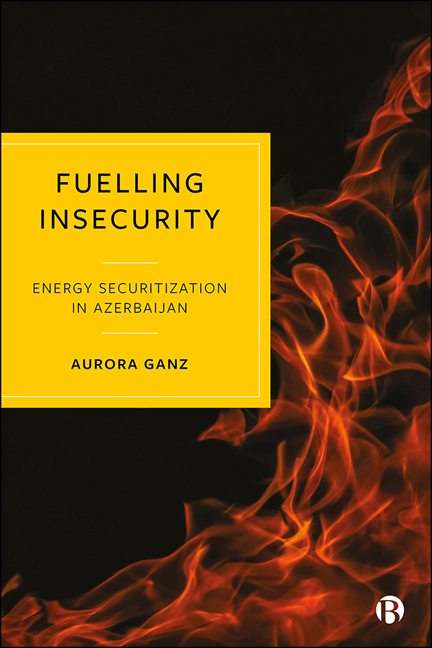Book contents
- Frontmatter
- Dedication
- Contents
- 1 Introduction
- 2 An Analysis of Actually Existing Energy Securitizations
- 3 Energy Securitization in the Land of Fire
- 4 Everyday Practices of Energy Security in Azerbaijan
- 5 Beyond the National Borders: NATO and Energy Security in Azerbaijan
- 6 Energy Securitization and the Private Sector: The Case of BP
- 7 Energy (In)Securitization: Abusive Security Practices and Poor Energy Choices
- 8 Conclusion
- References
- Index
6 - Energy Securitization and the Private Sector: The Case of BP
Published online by Cambridge University Press: 13 May 2022
- Frontmatter
- Dedication
- Contents
- 1 Introduction
- 2 An Analysis of Actually Existing Energy Securitizations
- 3 Energy Securitization in the Land of Fire
- 4 Everyday Practices of Energy Security in Azerbaijan
- 5 Beyond the National Borders: NATO and Energy Security in Azerbaijan
- 6 Energy Securitization and the Private Sector: The Case of BP
- 7 Energy (In)Securitization: Abusive Security Practices and Poor Energy Choices
- 8 Conclusion
- References
- Index
Summary
When Heydar Aliyev signed the Contract of the Century with a consortium of multinational corporations in 1994, he opened up Azerbaijan's oil and gas sector to foreign investors. While the government decided not to privatize the industry and retain control over its assets and wealth, they also realized that the prospect of profits and new business projects required substantial investments. Aliyev saw external financial intervention as the main hope for the country's economic recovery and decided to make the industry reliant on external financing. Seeing no incentive to limit foreign participation, Aliyev sought to create the most favourable investment environment by eliminating any entry barrier to foreign private companies and inviting energy multinationals to take a direct role in managing and developing the country's natural resources. Aliyev's decision stands out when compared to the choices made by the leaders of Azerbaijan's neighbouring countries: in the early years after the dissolution of the USSR, among the newly born countries there was still much reticence towards international actors, to the extent that Turkmenistan and Uzbekistan opted to keep full state ownership of their energy industry and rejected the possibility of foreign investments, while the Russian Federation decided to privatize the industry domestically, opening the sector only to Russian capitalists (Luong and Weinthal 2001). Kazakhstan emerges as a peculiar and exceptional case: while in the first years of its independence (1991), the government opted for liberalizing the sector and opening the oil and gas industry to foreign investors, since the mid 2000s it has reversed its policy and opted for a progressive nationalization of its energy assets (see Orazgaliyev 2019).
Today, Azerbaijan's energy industry is fully integrated into the global energy market and completely dependent on foreign investments. This is not an exceptional case but reflects larger trends within the energy sector. Overall, the energy industry – especially oil and gas – is considered by many as the most capitalized and globalized sector on the planet (Boal et al 2005; Di Muzio 2016). It is understood as emblematic of the globalized neoliberal, capitalist economy: it abides by capitalist rules, and capitalism cannot survive without energy production and consumption.
- Type
- Chapter
- Information
- Fuelling InsecurityEnergy Securitization in Azerbaijan, pp. 122 - 144Publisher: Bristol University PressPrint publication year: 2021

